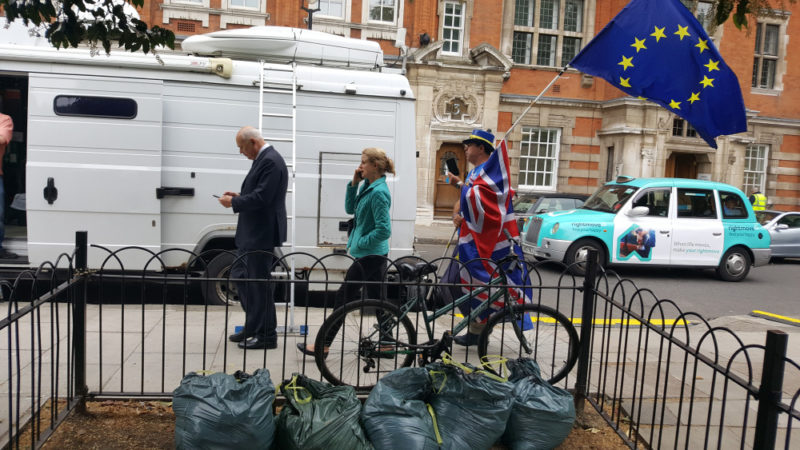
Increasingly, residents we represent in Wandsworth are telling us they are dismayed by Brexit and would like local councillors to take a stand on their behalf. We’ve heard the argument that Brexit is a national issue – not something local councillors should involve themselves with – but, as our mail bags swell, we don’t buy it. Austerity is a national issue, yet councillors campaign tirelessly against it. The NHS is a national issue, but as any Labour councillor can tell you, when a local clinic is closed we Labour councillors stand up and oppose. Brexit should be no different. Of course it’s true that as local councillors we can’t join the Brexit debates in parliament, but it’s equally true that if Brexit goes ahead, especially a ‘no deal’ Brexit, those most affect will come to our surgeries. Just as with austerity, we’ll be the ones applying the sticking plasters to the wounds inflicted by this national policy, perhaps for years to come. And those local impacts are far from inconsequential.
Councils are responsible for enforcing trading, environmental, energy efficiency and air quality standards and waste regulations, all of which originate from the EU. If we leave without a deal, nobody can say what the new standards will be, leaving councils in the dark as to how to enforce them. Our large procurement contracts go through the EU’s tendering process (OJEU) – in the event that we leave, there is a risk that these tenders could be challenged. Many of the country’s poorest areas receive structural funds from the EU to boost the local economy and the European Investment Bank part funds regeneration projects across the country. If we leave, those funds, and the jobs they generate, will disappear, and it will be local councils faced with rising demands on their housing services as a result. In Wandsworth, the Battersea Power Station developers have already cited uncertainty caused by Brexit as the reason for reducing the number of affordable homes on the site.
Local schools will not be exempt. In some areas, pupil numbers are already dropping as parents return home and fewer families – especially from Bulgaria, Poland and Romania – are making the decision to come to the UK to work. Drops in pupil numbers and predicted future numbers have budgetary implications, as schools are funded on a per-pupil basis. The worry is that this decline will lead to teacher redundancies. And if food prices go up after Brexit, as many predict, this will also have an impact on school catering contracts and school budgets.
In terms of local healthcare, the likely Brexit fall-out has already been widely reported. At my local hospital, St George’s, 16% of all staff come from the EU27. As well as relying on large numbers of EU27 employees, St George’s also relies heavily on EU funding for its research budgets, 13.5% (£1.4m) of which comes directly from the EU. According to St George’s Principal, Professor Higham: “There are millions of pounds at risk [from Brexit] in my own institution. What we are seeing already are changes in behaviour and pessimism about applying for and retaining a lead in European collaborations.” Other implications for local healthcare services are less obvious, but equally worrying for local councils. What impact will elderly “returnees” have on already-stretched local healthcare services? How will councils fill the vacancies left by non-British EU carers who’ve had enough and returned home? For councils with border control responsibilities, Brexit will have an even greater impact.
There will also be a human cost that councils will need to navigate. Councils don’t know what rights a child in their care born outside the UK will have after Brexit. Nor do local councils, some of which are due to hold elections this year, know what voting rights EU citizens with settled status will have, nor what rights current EU-27 citizens have to stand or re-stand for election. In Wandsworth, according to a report by leading economic analysts Cambridge Econometrics commissioned by the mayor, ‘no deal’ would put 2,300 jobs potentially under threat. According to a “Brexit Audit” recently carried out by European Movement Wandsworth, 61% of businesses and organisations surveyed in the borough are pessimistic about their prospects after Brexit. Around two thirds of the 87 businesses and organisations surveyed said that Brexit has made them less likely to hire new staff and new make new investments.
Brexit is a national issue, but as with everything national, it will be at a local level that its worst effects are felt. And in boroughs like Wandsworth, home to 26,000 EU27 citizens, where around 25% of the workforce comes from EU27 countries (30% in the hospitality sector), residents tell me that they fear that impact will be shattering. As Labour councillors, we should be standing with them to oppose.
Candida Jones and Fleur Anderson are joint deputy leaders of Wandsworth Labour.




More from LabourList
Government abandons plans to delay 30 local elections in England
‘The cost of living crisis is still Britain’s defining political challenge’
‘Nurses are finally getting the recognition they deserve’